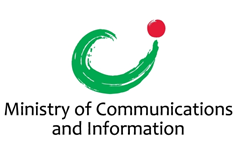Ministry of Digital Development and Information
 Logo of MCI | |
| Agency overview | |
|---|---|
| Formed | 28 November 1990 |
| Preceding agency |
|
| Jurisdiction | Government of Singapore |
| Headquarters | 140 Hill Street #01-01A, Old Hill Street Police Station, Singapore 179369 |
| Employees | 364 [1] |
| Annual budget | $706.81 million[2] SGD (2014) |
| Ministers responsible |
|
| Agency executives |
|
| Child agencies | |
| Website | www |
1°17′26.61″N 103°50′53.31″E / 1.2907250°N 103.8481417°E
The Ministry of Communications and Information (Abbreviation: MCI; Template:Lang-ms; Chinese: 通讯及新闻部) is a ministry of the Government of Singapore. It is in charge of information and communications technology, the media and design sectors, public libraries, as well as the Government's information and public communication policies.
History

On 5 June 1959, the Ministry of Culture came into being with the swearing-in and appointments of ministers of the new Government of Singapore. On 1 February 1980, the Broadcasting Division of the Ministry of Culture became a statutory board, the Singapore Broadcasting Corporation.
1985 saw the dissolution of the Ministry of Culture. Its Information Division came under the new Ministry of Communications and Information (MCI). Its arts promotion component was assimilated into the Ministry of Community Development (MCD) as the Cultural Affairs Division.
Five years later, on 28 November 1990, the Information Division of the MCI and the Cultural Affairs Division of MCD, together with other associated departments and statutory boards, reunited to form the Ministry of Information and the Arts (MITA).
On 1 September 1991, the Festival of Arts Secretariat, Singapore Cultural Foundation, the Arts Division of MITA, and the National Theatre Trust merged to form the National Arts Council (NAC).
On 1 October 1994, the Singapore Broadcasting Authority (SBA) was formed as a statutory board under MITA to oversee and promote the broadcasting industry in Singapore.
On 23 November 2001, the information and communications technology (ICT) functions under the Ministry of Communications and Information Technology came under MITA. The expanded Ministry was renamed the Ministry of Information, Communications and the Arts, but retained the acronym MITA. In that year, Infocomm Development Authority (IDA) became one of MITA's statutory boards.
On 1 January 2003, the Singapore Broadcasting Authority, Singapore Films Commission and Films and Publications Department (previously under the MITA headquarters) merged to form the Media Development Authority (MDA). On 13 August 2004, the Ministry's acronym was changed from "MITA" to "MICA".
On 1 November 2012, MICA was renamed the Ministry of Communications and Information (MCI). The move followed the restructuring of two previous ministries – MICA and the Ministry of Community Development, Youth and Sports (MCYS) – into MCI, the Ministry of Culture, Community and Youth (MCCY) and the Ministry of Social and Family Development (MSF). REACH (Reaching Everyone for Active Citizenry @ Home) was assimilated into MCI while the resilience, arts and heritage portfolios became part of MCCY. MCI now oversees the development of the information and communications technology, media and design sectors, public libraries, and the Government’s information and public communication policies.[4]
On 18 January 2016, MCI announced that the Infocomm Development Authority of Singapore (IDA) and the Media Development Authority (MDA) will be restructured into two new entities: The Infocommunications Media Development Authority (IMDA) and the Government Technology Organisation (GTO), in the second half of 2016.[5]
Statutory boards
MCI has 2 statutory boards:
MCI also manages:
- DesignSingapore Council, a department in the ministry and the national agency for design.
- Cyber Security Agency, a national agency overseeing cybersecurity strategy, operations, education, outreach, and ecosystem development.
- Personal Data Protection Commission, Singapore's primary data protection authority.
Minister for Communications and Information
| Years in Office | Minister | Remarks |
|---|---|---|
| 1959 - 1965 | S Rajaratnam | Minister for Culture |
| 1965 - 1968 | Othman Wok | Minister for Culture and Social Affairs |
| 1968 - 1969 | Jek Yuen Thong | Minister for Culture |
| 1969 - 1978 | Wee Toon Boon | Minister for Culture |
| 1978 - 1981 | Ong Teng Cheong | Minister for Culture |
| 1981 - 1985 | S Dhanabalan | Minister for Culture |
| 1985 - 1990 | Yeo Ning Hong | Minister for Communications and Information |
| 1990 - 1999 | George Yeo | Minister for Information and the Arts |
| 1999 - 2001 | Lee Yock Suan | Minister for Information and the Arts |
| 2001 - 2003 | David Lim Tik En | Minister for Information, Communications and the Arts |
| 2003 - 2009 | Lee Boon Yang | Minister for Information, Communications and the Arts |
| 2009 - 2011 | Lui Tuck Yew | Minister for Information, Communications and the Arts |
| 2011 - 2012 | Yaacob Ibrahim | Minister for Information, Communications and the Arts |
| 2012 - 2018 | Yaacob Ibrahim | Minister for Communications and Information |
| 2018 - | S. Iswaran | Minister for Communications and Information. |
References
- ^ "Head Q: Ministry of Information, Communications and the Arts" (PDF). Budget 2010: Revenue and Expenditure Estimates. Ministry of Finance. February 2010. Retrieved 14 September 2010.
- ^ "404 Error Page" (PDF). www.singaporebudget.gov.sg.
{{cite web}}: Cite uses generic title (help) - ^ "Changes in Permanent Secretary appointments from January 2017". Channel NewsAsia. Retrieved 15 January 2017.
- ^ Imelda Saad; S. Ramesh (31 July 2012), MCYS, MICA to be restructured to form 3 new ministries, Channel NewsAsia
- ^ "IDA, MDA to be restructured to capitalise on converging media and ICT landscape". Channel NewsAsia. Retrieved 23 January 2016.
External links
